Intrinsic-ID IP
Filter
Compare
24
IP
from
10
vendors
(1
-
10)
-
PUF FPGA-Xilinx Premium with key wrap
- Proven “Soft” PUF implementation for AMD/Xilinx FPGAs, part of the FPGA configuration file
- Offers FPGA users a cryptographic technology to secure their own keys and to authenticate devices and communications between them on networks.
- Enables remote “brownfield” installation of hardware-based security
-
On-Die PDN Analyzer for Transistor-Level Visibility and Telemetry
- The Aeonic Insight™ PDN IQ is an in-situ, on-die PDN (Power Delivery Network) analyzer providing transistorlevel PDN telemetry at nanosecond scale.
- The telemetry provided can be applied across the silicon lifecycle to optimize power, performance, and reliability.
- PDN IQ can be used to characterize V-F curves to develop an optimal setpoint to balance power and performance.
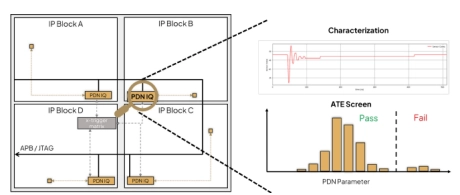
-
Three-Speed Inline Library with Open Drain I/0 in TSMC 22nm
- A TSMC 22nm Inline, Flip Chip compatible library with three-speed GPIOs and I2C compliant ODIO.
- This silicon-proven, flip chip library in TSMC 22nm boasts three variants of GPIOs and one ODIO.
- All GPIO and ODIO cells have NS and EW orientation.
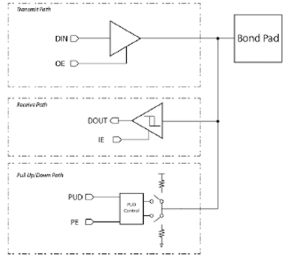
-
PUF FPGA-Xilinx Base
- Proven “Soft” PUF implementation for AMD/Xilinx FPGAs, part of the FPGA configuration file
- Offers FPGA users a cryptographic technology to secure their own keys and to authenticate devices and communications between them on networks.
- Enables remote “brownfield” installation of hardware-based security
- Offers key provisioning, wrapping, and unwrapping to enable secure key storage across the supply chain and for the lifetime of the device
-
TLS 1.3 Compliant Crypto Coprocessor
- NIST CAVP certified and OSCCA standard compliant crypto engine suite
- Includes private/public key ciphers, message authentication code, hashes, and key derivation
- Key wrapping function for the secure export of keys
- Public-key coprocessor for digital signatures and key agreements over elliptic/Edward curves
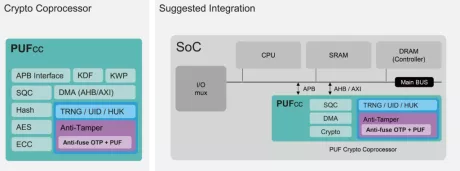
-
MIPI D-PHY Rx IP, Silicon Proven in GF 55LP
- Compliant to MIPI Alliance Standard for D-PHY specification Version 1.2
- Supports standard PPI interface compliant to MIPI Specification
- Supports synchronous transfer at high-speed mode with a bit rate of 80-2500 Mb/s
- Supports asynchronous transfer at low power mode with a bit rate of 10 Mb/s
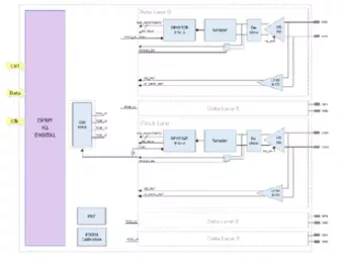
-
VDAC
- ? 10-bit Resolution
- ? 1 to 300 MSPS Update Rate
- ? One to six channel Video DAC
- ? Programmable output swing from 0.56V to 1.3V
-
MIPI D-PHY Rx IP, Silicon Proven in TSMC 40LP
- Compliant to MIPI Alliance Standard for D-PHY specification Version 1.2
- Supports standard PPI interface compliant to MIPI Specification
- Supports synchronous transfer at high-speed mode with a bit rate of 80-2500 Mb/s
- Supports asynchronous transfer at low power mode with a bit rate of 10 Mb/s
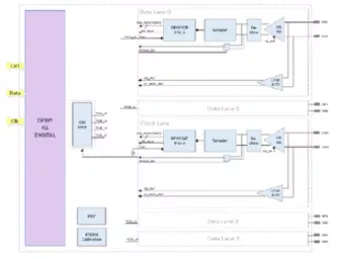
-
MIPI D-PHY Rx IP, Silicon Proven in TSMC 16FFC
- Compliant to MIPI Alliance Standard for
- D-PHY specification Version 1.2
- Supports standard PPI interface compliant to MIPI Specification
- Supports synchronous transfer at high speed mode with a bit rate of 80-2500 Mb/s
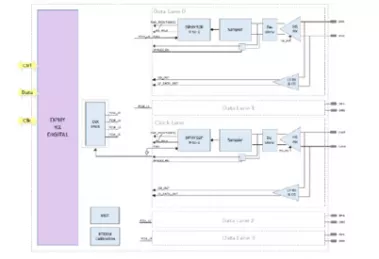
-
256 8-bit-MAC DSP core
- High performance vector signal processing and efficient control code processing
- 256 8-bit macs, or 128 16-bit macs, or 32-bit macs per cycle
- Flexible vector permute operations
- Maskable vector lanes